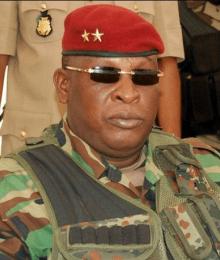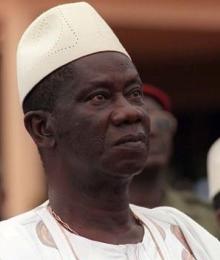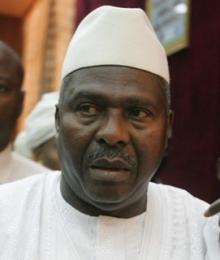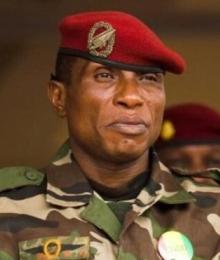
Sékouba Konaté (born June 6, 1964) is a Guinean military and statesman. From a modest background, he joined the Guinean army in 1985 and gradually climbed the ranks thanks to a solid training, especially abroad. Known as the "Tiger" for his ferocious fighting, Konaté was best known for his operations at the borders with Liberia and Sierra Leone in the early 2000s. Named commander of the prestigious Airborne Troops Battalion in 2008, he was one of the instigators of the coup d'état that overthrew President Lansana Conté the same year.
Pushed to the head of state in 2009 after distancing himself from the bloody junta of Moussa Dadis Camara, Konaté was entrusted with the heavy responsibility of organizing the democratic transition. Despite his inexperience in civil affairs, he managed to lead his country to the first free and democratic elections in 2010. This achievement, accomplished with pragmatism and integrity, is worthy of the praise of many African and Western leaders. Disinterested in the benefits of power, Konaté then preferred a discreet return to civil life, embodying a rare model of sober leadership in the service of the nation's superior interest.
Introduction
Sékouba Konaté is an emblematic figure in Guinea's recent history. A military career, he played a key role in the country's democratic transition after years of authoritarian rule. Born on 6 June 1964 in Conakry, Konaté ascended the ranks of the Guinean army until becoming the strong man of the transitional regime in 2009, before overseeing the organization of the first free elections in 2010. His atypical journey makes him a fascinating character, respected by many African and international leaders for his integrity and commitment to democracy.
Education
From a modest family, Sékouba Konaté grew up in the town of Kaloum in Conakry. From an early age, he was marked by the determination of his father, Commander Doubany Konaté, who instilled in him the values of discipline and rigour. After high school, he joined the Guinean army in 1985, continuing his military training abroad.
In 1996, he attended the courses of the Patent of Head of Paratrooping section in Pau, France, as well as the training of the 1st degree in Mont-Louis. His thirst for learning then led him to War School in China, where he deepened his strategic and tactical knowledge.
Military training
Sékouba Konaté's military training was rich and diverse, enabling him to acquire solid experience in the field. After joining the Guinean army in 1985, he gradually climbed the ladder until becoming deputy commander of the Parachutist Detachment at Labé in 1996, appointed by President Lansana Conté himself.
Between 2000 and 2002, Konaté gained popularity by participating in operations along the borders with Liberia and within the United Nations Mission in Sierra Leone. (MINUSIL). It was during this period that he obtained the nickname "Tiger" due to his fierceness in combat.
Military career
Sékouba Konaté's career saw a turning point in 2008 when he was appointed commander of the prestigious Autonomous Battalion of Airborne Troops (BATA), the elite unit of the Guinean army based at Camp Alpha Yaya Diallo. Its mission is then to put an end to repeated troop uprisings between 2007 and 2008.
On 23 December 2008, following the death of President Lansana Conté, Konaté was one of the main instigators of the military coup that brought Captain Moussa Dadis Camara to power. Nominated Brigadier General and Minister of Defence in the National Council for Democracy and Development (CNDD), the new junta, Konaté appears initially to support Camara.
CNDD
However, relations between the two men deteriorated rapidly following the massacre of 28 September 2009 by security forces against opposition protesters gathered at Conakry Stadium. Upon returning from a trip to Nzérékoré, Konaté distanced himself from Camara and tried in vain to arrest the suspect responsible for the massacre, Aboubacar Diakité.
On December 3, 2009, while Konate was in Lebanon, Diakite opened fire on Camara and wounded him seriously. Hospitalized in Morocco, Camara was forced into exile, leaving Konaté alone as president of the transition.
Events of September 28, 2009
The September 28, 2009 massacre will remain one of the darkest pages in Guinea's recent history. On that day, thousands of peaceful demonstrators gathered at the Conakry Stadium to demand the departure of Moussa Dadis Camara were the target of violent repression by the security forces.
According to human rights organizations, at least 157 people were killed and hundreds more injured. Cases of collective rape and looting have also been. Faced with the magnitude of the tragedy, Sékouba Konaté, then Minister of Defence, tried to distance himself from the Camara regime, but in vain.
These tragic events have deeply affected the Guinean and international public opinion, stressing the urgent need for a return to constitutional order and a smooth democratic transition.
Transitional President
Pushed to the head of the state by the Ouagadougou Agreements of 15 January 2010, Sékouba Konaté finds himself with the heavy task of organising free and transparent presidential elections, the first since the country's independence in 1958.
Aware of his civil governance shortcomings, he is surrounded by experienced advisers such as Tibou Kamara, who was appointed Secretary-General at the presidency. Konaté focuses mainly on security issues, an area in which he excels.
Despite the tensions and violence that broke out between the supporters of the two finalists, Alpha Condé and Cellou Dalein Diallo, Konaté managed to complete the electoral process. The second round, originally scheduled for 2010, was eventually postponed to 2011 due to logistical difficulties.
Organization of the 2010 elections
The organization of the 2010 presidential elections represented a major challenge for the transitional regime led by Sékouba Konaté. After decades of authoritarian rule, it was the first free and democratic elections in Guinea's history.
From the outset, the process has been plagued by controversy, concerning the constitution of electoral lists. The first round, held on 27 June 2010, was marked by irregularities and sporadic violence.
In the face of contestation of the results by the supporters of the two finalists, Alpha Condé and Cellou Dalein Diallo, Konaté had to postpone the second round several times. Finally, it was not until 7 November 2010, four months after the first round, that the Guineans could go to the polls to separate the two candidates.
Despite tensions and clashes between the two sides, the vote took place in a relatively calm atmosphere, under the watchful eye of international observers. Alpha Condé was finally declared the winner with 53.5% of the vote, marking the end of the transition.
Exile
After successfully overseeing the electoral process, Sékouba Konaté left Guinea in December 2010 to take up his new position as the High Representative of the African Union in Addis Ababa, Ethiopia. Appointed by the Chairman of the AU Commission, Jean Ping, Konaté is responsible for the operationalization of the African Force pending and for the strategic planning of peacekeeping operations.
During this period, he spent several years in Addis Ababa, putting his military experience in the service of the pan-African organization. He then chained with stays in the United States and Morocco, remaining away from the political scene of Guinea, before finally settling in France in 2014.
His voluntary exile ends in December 2021, when the ruling military junta in Guinea authorizes him, along with former President Moussa Dadis Camara, to return to the country. On December 24, 2021, Konaté once again set foot on Guinean soil after a 12-year absence, welcomed as a hero by his supporters at the Conakry airport.
Character
Beyond his unusual journey, it is the atypical personality of Sékouba Konaté that has marked the spirits, both in Guinea and internationally. Described as a discreet or even shy man, the "Tiger" breaks with the image of an authoritarian military hungry for power.
Of a naturally reserved, almost introverted nature, Konaté seems to have been deeply marked by the dramas of his childhood, such as the early loss of his parents. These trials may have made him suspicious of honours and led him to seek a simple life, away from the fasts of power.
Pragmatic and realistic, he never hid his desire to resign as soon as possible, contrary to the customs of African leaders. His commitment to regaining his freedom and his anonymity say a lot about his personal values, far from the temptations of the presidential apparatus.
Private life
Few details have been leaked about Sékouba Konaté's privacy, in accordance with his taste for discretion. He is known to be married to Mariama Sako Hall Konaté and father of four children, with whom he shares a modest existence in Taouyah, in the suburbs of Conakry.
Far from the fasts of the presidential residence of Boulbinet, which he briefly occupied, Konaté seems to have always favoured simple pleasures: an unpretentious interior, family meals around the "rize du pays", recreations such as watching TV or surfing the internet.
A single man hardened in his soul, he appreciates being able to go out freely, to have a drink with friends without constantly being surrounded by a close guard. A way of life in total conformity with the man erased and laid down that he has always been.
Conclusion
Sékouba Konaté's unusual journey makes him a respected and admired figure, far beyond the borders of Guinea. A military disinterested in power, he was able to conduct the delicate democratic transition of his country with integrity after decades of authoritarian rule.
His unwavering attachment to republican values, his constant concern for the supreme interest of the nation, contributed greatly to the success of the 2010 election process and to the arrival of a peaceful constitutional order. For these reasons, many African and Western leaders have expressed their appreciation and gratitude to him.
Today withdrawn from public life, the "Tiger" of Guinea can boast of having shown that another type of leadership was possible in Africa: sober, disinterested and totally dedicated to the common good. A model unfortunately too rare on a continent still too often gangrened by the autocratic drifts of power.

















